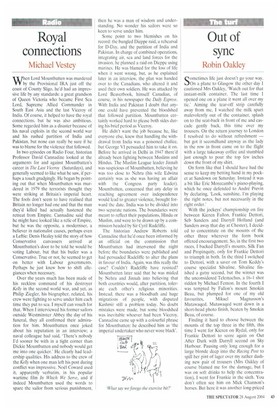Royal connections
Michael Vestey
When Lord Mountbatten was murdered by the Provisional IRA just off the coast of County Sligo, he'd had an impressive life by any standards: a great grandson of Queen Victoria who became First Sea Lord, Supreme Allied Commander in South East Asia and the last Viceroy of India. Of course, it helped to have the royal connections, but he was also ambitious. Some regarded him as a disaster because of his naval exploits in the second world war and his rushed partition of India and Pakistan, but none can really be sure if he was to blame for the violence that followed.
In two episodes on Radio Four, historian Professor David Cannadine looked at the arguments for and against Mountbatten's career in The Last Viceroy (Saturdays), and generally seemed to like what he saw, if perhaps a touch grudgingly. He began by pointing out that when Mountbatten was murdered in 1979 the terrorists thought they were striking at Britain's imperial heart. The fools don't seem to have realised that Britain no longer had one and that the man they'd killed had actually hastened the retreat from Empire. Cannadine said that he might have looked like a relic of Empire, but he was the opposite, a moderniser, a believer in nationalist causes, perhaps even a Leftie: Denis Healey told the story of how Conservative canvassers arrived at Mountbatten's door to be told he would be voting Labour, but that his butler was a Conservative. True or not, he seemed to get on better with Labour governments. Perhaps he just knew how to shift allegiances when necessary.
Over the years much has been made of his reckless command of his destroyer Kelly in the second world war, and yet, as Philip Ziegler, his biographer, related, his crew were fighting to serve under him each time they put to sea. I myself can vouch for that. When I interviewed his former sailors outside Westminster Abbey the day of his funeral, they all confirmed their admiration for him. Mountbatten once joked about his reputation in an interview; a naval colleague had said, 'There's nobody I'd sooner be with in a tight corner than Dickie Mountbatten and nobody would get me into one quicker.' He clearly had leadership qualities. His address to the crew of the Kelly when one man left his post during conflict was impressive. Noel Coward used it, apparently verbatim, in his popular wartime film In Which We Serve, and if indeed Mountbatten used the words to spare the sailor from serious punishment, then he was a man of wisdom and understanding. No wonder his sailors were so keen to serve under him.
Some point to two blemishes on his record: the bungled Dieppe raid, a rehearsal for D-Day, and the partition of India and Pakistan. In charge of combined operations, integrating air, sea and land forces for the invasion, he planned a raid on Dieppe using marines. He was blamed for the loss of life when it went wrong, but, as he explained later in an interview, the plan was handed over to the Canadians, who altered it and used their own soldiers. He was attacked by Lord Beaverbook, himself Canadian, of course, in his newspaper the Daily Express. With India and Pakistan I doubt that anyone could have prevented the bloodshed that followed partition. Mountbatten certainly worked hard to please both sides during his brief period as Viceroy.
He didn't want the job because he, like everyone else, knew that handling the withdrawal from India was a poisoned chalice, but George VI persuaded him to take it on. Before he arrived in Delhi in 1947 there'd already been fighting between Muslims and Hindus. The Muslim League leader Jinnah was suspicious of Mountbatten, believing he was too close to Nehru (his wife Edwina certainly was as she was having an affair with the Congress party leader). Mountbatten, concerned that any delay in reaching agreement over independence would lead to greater violence, brought forward the date. India was to he divided into two separate nations. The boundaries were meant to reflect their populations, Hindu or Muslim, and were to be drawn up by a commission headed by Sir Cyril Radcliffe.
The historian Andrew Roberts told Cannadine that he'd once been informed by an official on the commission that Mountbatten had intervened the night before the boundaries were published and had persuaded Radcliffe to alter the plans in favour of India. Again, was this really the case? Couldn't Radcliffe have resisted? Mountbatten later said that he was misled by Nehru and Jinnah into believing that both countries would, after partition, tolerate each other's religious minorities. Instead, there was a bloodbath and huge migrations of people, with disputed Kashmir still a problem today. No doubt mistakes were made, but some bloodshed was inevitable whoever had been Viceroy. Cannadine came up with a colourful phrase for Mountbatten: he described him as 'the imperial undertaker who never wore black'.


























































 Previous page
Previous page